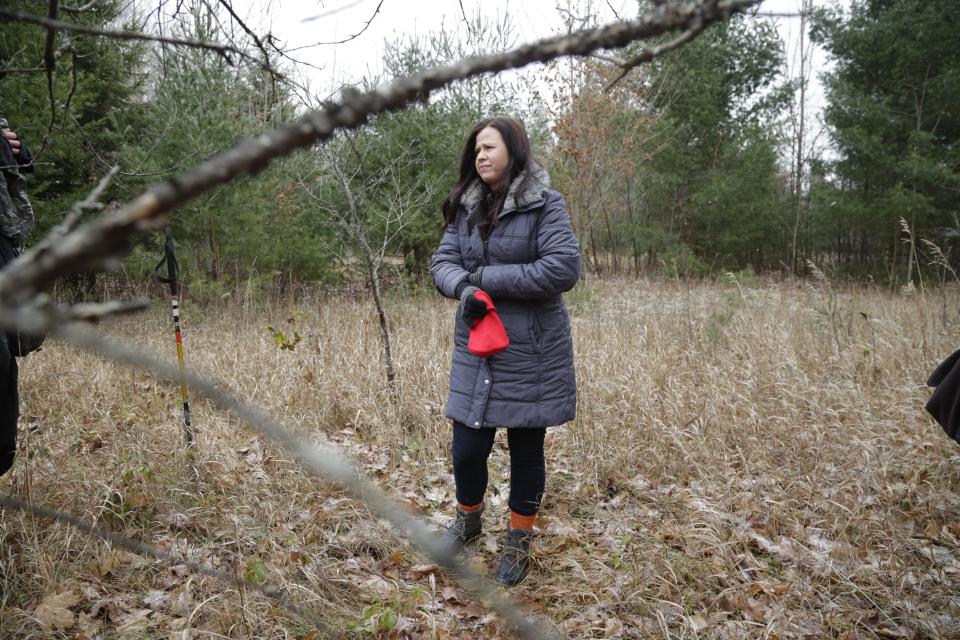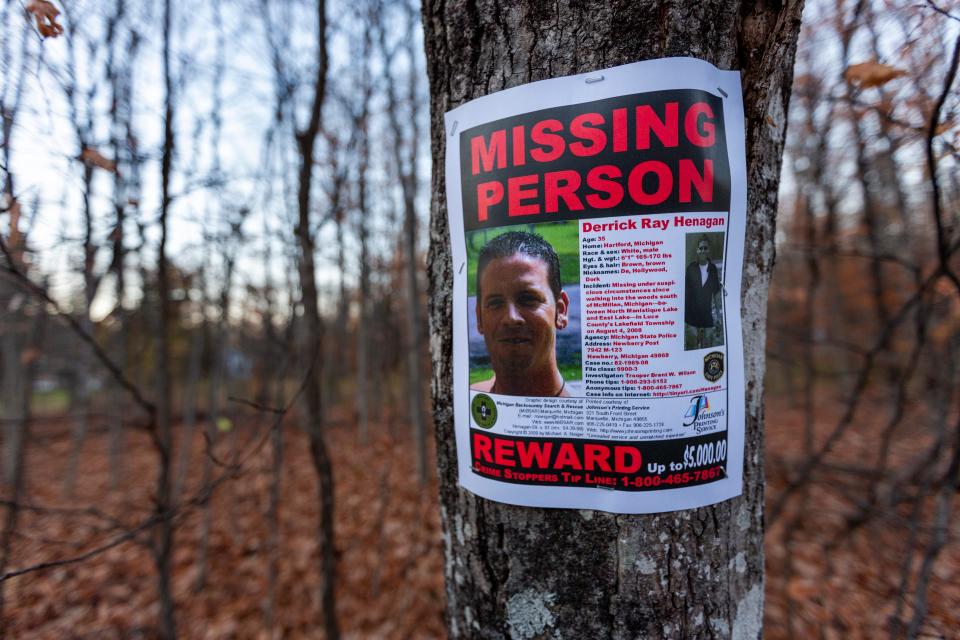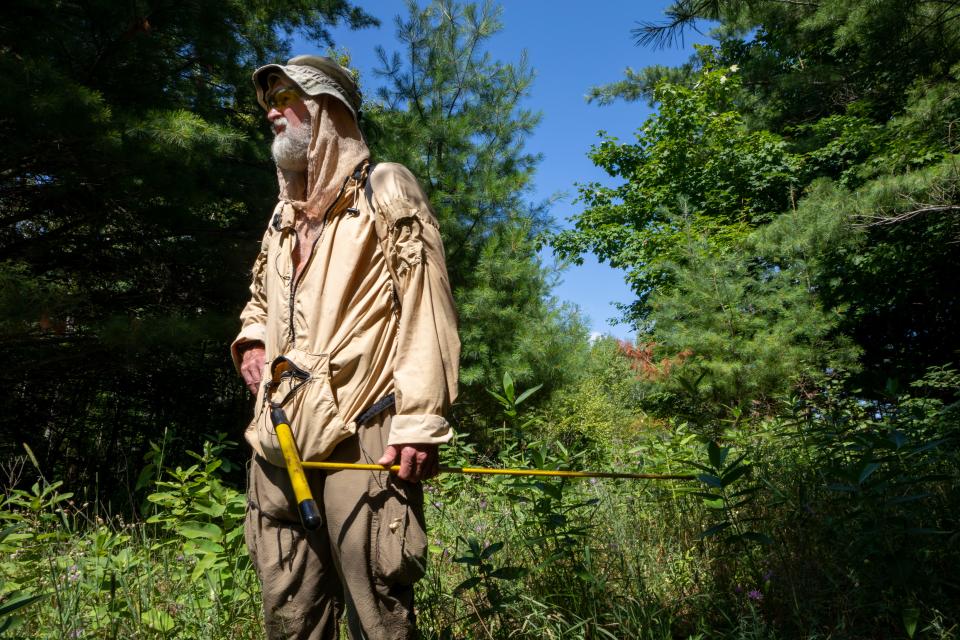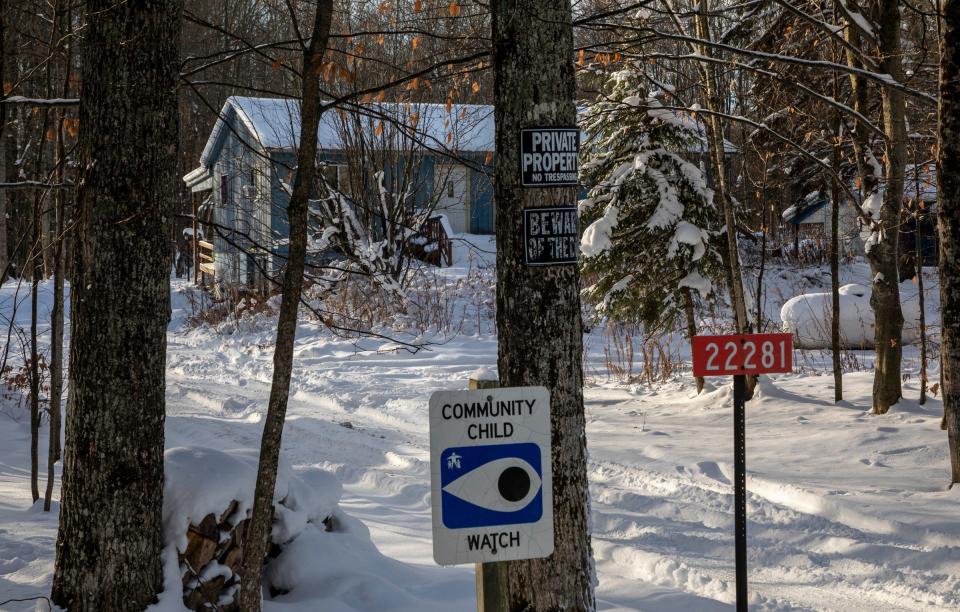Michigan State Police face suspicion for handling of cold case murder

Listen to the 'Where Secrets Go To Die' podcast here
Spoiler alert: This story contains plot twists in the "Where Secrets Go To Die" podcast.
A cold case murder in the Upper Peninsula has simmered for 15 years, fueling suspicions about what happened to a missing man and how the Michigan State Police handled the case.
Derrick Henagan disappeared Aug. 4, 2008. His body has never been found, and no one has ever been charged with his death.
Some outside observers have criticized the State Police investigation, especially after concerns were raised that a local state trooper could be involved.
A yearslong Free Press review of the case is chronicled in the eight-episode podcast “Where Secrets Go to Die: The Disappearance of Derrick Henagan.” Findings include:
State Police sent cadaver dogs to the home of a former state trooper, David Moeggenborg, to search for Henagan’s remains.
They lab tested an ax from Moeggenborg's home for blood and fingerprints.
They redacted police reports under the state Freedom of Information Act, released to the Free Press, about an interview they conducted with Henagan's girlfriend concerning her possible ties to Moeggenborg.
One outside investigator told the Free Press that the girlfriend, Dyanna Maddox, boasted of having Moeggenborg in her back pocket. Maddox denies any involvement in the disappearance.
The State Police also waited months to examine some evidence and years before interviewing members of Maddox’s family, several of whom struggled to remember timelines.

More: What Michigan State Police reports show — and hide — in Derrick Henagan disappearance
Michael Neiger spent 25 years with the State Police, including years in the crime lab, before retiring and starting his own search and rescue firm that assists the families of missing people. He has worked on the case for years on behalf of Henagan’s family and said he’s troubled by the way it has been investigated.
“It appears to me the mishandling of this case by the MSP is likely due to certain individuals being ethically compromised, a failure to follow investigative best-practices, and just plain laziness,” he said.
State Police defended its handling of the case.
“I don't have reason to question the integrity of the investigation, based on the people that I believe were involved in that,” said Capt. Clint Michelin, who commanded the State Police in the Upper Peninsula when the Free Press inquired about the case, but has since retired. “They're good investigators with integrity and they're going to do the right thing, regardless of who's involved as a suspect in any particular case.”
Michelin didn’t work the case himself. The Free Press asked repeatedly to speak to an investigator who did and also sought an interview with then-director of the State Police Col. Joseph Gasper, who had supervised Moeggenborg at one point.
State Police directed inquiries to Michelin.
Michelin acknowledged that Moeggenborg’s name was brought up and said investigators appeared to be prudent by looking at him.
“I'm glad that the investigators paid close attention to detail and followed up on something that was a remote possibility to determine whether or not they had a starting point,” Michelin said. “From the sounds of it, though, none of it produced something to be that launching pad to continue further down that avenue.”
Troubled trooper
Moeggenborg has long cast a shadow over the case, in part because of proximity to it.
Moeggenborg responded to Maddox’s home the day that Henagan was last seen.
He took a break-in complaint from Maddox who said several guns were stolen. Maddox said that she and Henagan had fought a few days earlier and he was staying with friends down the road. She thought he broke in while she was away and took the guns.
That report was taken in the morning. Reports in the Henagan case say he was last seen that afternoon.
Moeggenborg also has drawn scrutiny because of his own troubled history.

Episode 4: Sins of the Father
The Free Press obtained more than 400 pages of internal affairs reports on him. The State Police heavily redacted them before turning them over but it was clear he was accused of domestic violence, child abuse and stalking.
His two former wives say they complained for years about his abuse to his supervisors, who often ignored their concerns. The women both recounted hearing him make death threats.
“He was all the time telling me, 'I can kill you, and nobody will ever know. Nobody will ever investigate it because I'm a cop,' ” his first wife, Amy Asher, 49, told the Free Press.
He also kept a coffee can with driver’s licenses of locals who’d been arrested. His daughter Meghan Moeggenborg, now 29, said he called them trophies.
She also told the Free Press that in August 2014, about six years after Henagan disappeared, she followed her father into the woods near his home and saw what appeared to be a makeshift graveyard. She said he threatened to kill her if she told anyone what she’d seen.

Episode 6: Drugs, Sex and Secrets
Several people in the Newberry area voiced deep distrust of the police. They told the Free Press that Moeggenborg and other members of law enforcement had been sexually involved with young women in the area. They believed some cops were trading or willing to trade leniency on drug crimes for sex. One woman who he was accused of assaulting was later murdered. A local drug dealer pleaded guilty to killing her and two others.
Michelin said he never heard such allegations about troopers.
Years later, it's a homicide
State Police didn’t pursue Meghan Moeggenborg’s tip about the woods right away but about six months later, David Moeggenborg died of cancer. A few weeks after his death, nine members of the Michigan State Police convened a conference call to discuss the Henagan case.
A report shows investigators decided to change the file class from a missing person to a homicide, noting in a report that “after 7 years without finding Derrick Henagan, it is our opinion that he is a victim of homicide.”

Episode 2: The Missing Man
The report went on to say they planned to “search several areas to possibly recover Henagan’s body.”
The report doesn’t mention property addresses. The Free Press obtained a separate report filed by the K-9 team, which confirmed that Moeggenborg’s home and the woods across the road were two of the search locations. The third one was the woods around the home Henagan shared with Maddox.
The case reports explain the reasoning for most searches in the investigation, but the search of Moeggenborg’s property was different. The reports offer no explanation.
Michelin wasn’t on the conference call in 2015 and said he didn’t know what prompted the change to a homicide classification or the search of Moeggenborg’s property.
David Hopper, a retired commander of the Newberry Post, is listed as being on the call. He told the Free Press he didn’t recall the meeting or the reason for the search.

He said Moeggenborg was well respected within the State Police, and he doesn’t believe Moeggenborg would be involved in anything criminal.
George Sailer, an inspector who was listed on the call and has since retired, emailed the Free Press after the podcast launched to say he didn’t recall the conference call meeting, either.
“I do remember the allegation of Trooper Moeggenborg’s potential involvement, however, I don’t recall why that was, or what the circumstances were that would lead anyone to that conclusion,” Sailer wrote in an email. “I want to say none of the suspicions about Trooper Moeggenborg were substantiated.”
Sailer is correct. The search of the properties found no human remains. The ax recovered at his home was tested in a lab, which found no blood or fingerprints of enough quality to compare.
Some of the internal affairs investigations into Moeggenborg during his career were sustained, but they weren’t connected to the Henagan case.
Sit and wait
The delay in searching those woods Moeggenborg’s daughter described wasn’t the first one in the case.
Neiger runs Michigan Backcountry Search and Rescue, which conducts searches and other investigations on behalf of families of missing people. He doesn’t charge for his services.
He got involved in the case through Henagan’s mother and had been helping State Police.
At one point, they asked him to search some swampy areas to possibly recover Henagan’s remains.

Episode 1: The Body Hunter
Separately, Neiger said, about nine months after Henagan disappeared, he obtained permission to search the home Henagan shared with Maddox. He told the Free Press he asked the State Police to join him but they declined. Nothing in the records show they ever searched that home.
Neiger said he went ahead and searched himself, using a cadaver dog. The dog hit on an area of drywall and some carpet that had been removed from the home. Neiger also found some drywall in a bedroom that had been repaired and repainted and found a red stain on a heat register that resembled blood.
He sealed the carpet in an evidence bag and alerted State Police detectives to his findings.
“It took post personnel three weeks to pick up the carpet specimen for further analysis, and the stain was never collected by post personnel,” Neiger said.
Reports obtained by the Free Press show Neiger bagged the carpet sample in May 2009 and the State Police delivered it to the crime lab in October 2010, almost 17 months later.
“I forced post personnel to submit the carpet specimen to the laboratory for analysis by threatening to pick it up from the post and submit it to a private crime lab for analysis, at my own expense,” he said.
Joe Giacalone, a retired New York detective who wrote a manual on cold case investigation and teaches criminal justice at John Jay College, said police likely missed an opportunity by not going on that search.
“Should the police have gone with them and checked things out? Yeah. Probably,” Giacalone said. “I mean, at this point, the guy has already, you know, went this far, you might as well just go to the house with him.”
Giacalone said he worried about Neiger’s search, even though Neiger had worked for the State Police, collecting evidence.
“Just from an evidence standpoint, it’s a problem. You have a private person and he's a civilian, gathering evidence and submitting it to the police at that point,” he said. “And even from a retired guy, like why wouldn't they? Why wouldn't the cops want to go with him? Those are questions I'd like to see answered.”
Records also show State Police never searched the home of the neighbor down the road where Henagan spent the weekend before he disappeared, even after the homeowner consented to a search.

Other delays also appear throughout the case file.
Maddox had three daughters living with her when Henagan went missing and about a month later, police noted their names in the report.
But they didn’t interview the daughters until years later, the first one coming in 2013 and the other two in 2015.
One daughter told police she heard gunshots near the house on the day Henagan disappeared and said she’d seen her sister go to a local market to buy bleach. She later said she didn’t see her sister go to buy bleach but insisted she heard the gunshots.
Episode 3: Bleach and Blood
Another daughter described a phone call between Henagan and Maddox in which he said he feared for his life.
The first interview of Maddox’s brother wasn’t conducted until two and a half years after Henagan’s disappearance, and the first interview of her sisters came almost seven years after the fact.
Maddox’s brother later failed a polygraph test, afterward blaming it on drinking until 5 a.m. the day of the test. He also denied any involvement in Henagan’s disappearance.

Episode 5: The Bounty Hunter
One of her sisters told police that she remembered visiting the house around the time Henagan disappeared and seeing spots of blood on the garage floor. She couldn’t pinpoint a date.
Maddox’s brother-in-law was interviewed by police in 2015 and described a phone call he said Maddox placed to her sister. He quoted Maddox saying she and Henagan were fighting real bad and “there’s blood all over.” He couldn’t pinpoint a date, either.
Maddox’s landlord also was interviewed years later and described finding damaged doors, bleach stains on the carpet and drywall that was repaired and repainted in the house after Maddox moved out.
“Despite the involvement of upwards of 40 members of the MSP, some of the most basic investigative best practices were not followed in this case,” Neiger said.
Giacalone said that it appears the police missed a lot of opportunities in the case, but he also said police are human and make mistakes.
“There's a difference between a conspiracy and incompetence, right?” he said. “It’s totally two different things.”
Episode 7: The Ax in the Wall
Episode 8: The Empty Grave
Giacalone said he thinks State Police even today could review the case themselves if they did it correctly.
“The likelihood of any of the people from the original investigation being around still is pretty close to zero,” he said. “So I don’t see that as a major issue.”
Neiger said he thinks the case deserves outside attention. He said he has approached the FBI about it, and they’ve shown some interest. The FBI wouldn’t confirm or deny an investigation.
The Free Press requested any FBI records on the case under the Freedom of Information Act. The Bureau said it has some records related to it, but it hasn't yet provided them. FOIA requests to the FBI can take years to process.
Michelin said the State Police takes reports of misconduct seriously and investigates them thoroughly but Neiger said outside oversight is needed, perhaps from the Michigan Attorney General’s Office or the FBI.
“Like other police agencies, the MSP is incapable of effectively policing itself, especially due to the outsized influence command staff have over such investigations and outcomes, particularly those involving their friends and enemies,” he said.
This story includes just some of the findings from the "Where Secrets Go To Die" podcast. The first three episodes are now available for all listeners at freep.com/secrets, on Apple Podcasts, on Spotify, or wherever you get your podcasts. Can't wait to binge all eight episodes? The full podcast is available to Detroit Free Press subscribers in a special playlist. Also, check out our landing page, our cast of characters and our episode pages (listed on our landing page) to see photos, videos, documents and more tied to the case.
Contact us: 248-702-4092 or through encrypted email at wiselyj@proton.me
Subscribe to the Secrets newsletter for updates on the podcast. Subscribe to the Free Press to support investigative journalism.
This article originally appeared on Detroit Free Press: Michigan State Police handling of cold case raises questions

